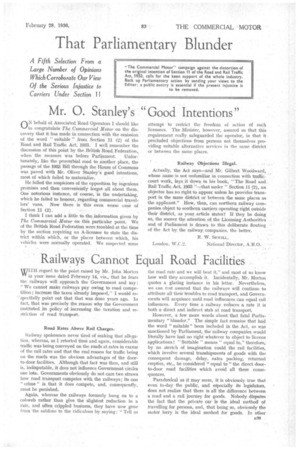That Parliamentary Blunder
Page 53

If you've noticed an error in this article please click here to report it so we can fix it.
Mr. 0. Stanley's "Good Intentions"
f-NN behalf of Associated Road Operators I should like ‘.../to congratulate The Commercial Motor on the discovery that it has made in connection with the omission of the word " suitable " from Section 11 (2) of the Road and Rail Traffic Act, 1933. I well remember the discussion of this point by the British Road, Federation,. when the measure was before Parliament. Unfortunately, like the proverbial road to another place, the passage of the 1933 Bill through the House of Commons was paved with Mr. Oliver Stanley's good intentions,
most of which failed to materialize, He lulled the suspicions of the opposition by ingenious promises and then conveniently forgot all about them. One notorious instance, of course, is the undertaking, which he failed to honour, regarding commercial travellers' vans. Now there is this even worse case of Section 11 (2).
I think I can add a little to the information given by The Commercial Motor on this particular point. We of the British Road Federation were troubled at the time by the section requiring an A-licensee to state the district within which, or the places between which, his vehicles were normally operated. We suspected some attempt to restrict the freedom of action of such• licensees. The Minister, however, assured us that this requirement really safeguarded the operator, in that it precluded objections from persons not themselves providing suitable alternative services in the same district or between the same places.
Railway Objections Illegal.
Actually, the Act says--and Mr. Gilbert Woodward, whose name is not unfamiliar in connection with trafficcourt work, lays it down in his book, " The Road and Rail Traffic Act, 1933 "—that under "Section 11 (2), au. objector has ea right to appear unless he provides trans-. port in the same district or between the same places as the applicant." How, then, can northern railway companies object to southern carriers operating right outside their district, as your article states? If they be doing so, the sooner the attention of the Licensing Authorities and of Parliament is drawn to this deliberate flouting of the Act by the railway_ companies, the better.
R. W. SEWILL,
London, W .0 . . National Director, A.R.O.




























































































